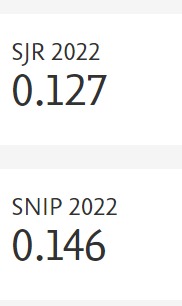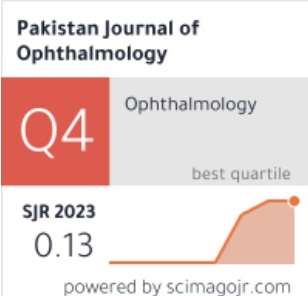A Pilot Study on Knowledge, Attitude, and Practice Regarding the Use of Dietary Supplements as Adjuvant Therapy for Glaucoma
10.36351/pjo.v41i1.1845
DOI:
https://doi.org/10.36351/pjo.v41i1.1845Abstract
Purpose: To find out knowledge, attitude, and practice among ophthalmologists regarding nutritional supplements in the management of glaucoma.
Study Design: Cross sectional study.
Place and Duration of Study: Lotus Eye Hospital and the College of Optometry.
Methods: A questionnaire-based cross-sectional pilot study was conducted. All questions in the 4-section questionnaire were mandatory. A Google form was created to share the questionnaire with potential participants. The final questionnaire link was emailed, distributed, and posted on social media to ophthalmologists. Final analysis was done after the data was manually entered into an excel sheet. Chi-square test was used to find out any association of knowledge, attitude, and practice based on years of experience, gender, and place of practice. P value < 0.05 was considered statistically significant.
Results: Out of 156 ophthalmologists, there were 99 males and 57 females. The average age was 41.88±6.15 years. Only 57.5% had good to fair knowledge, 25% had a positive attitude towards the role of nutritional supplements in glaucoma management, and practice patterns showed that only 30% prescribed supplements. The commonly prescribed supplements were Lutein, Zeaxanthin, flavonoids, and Omega3. A statistically significant 73% of respondents worked in private hospitals and 27% in public hospitals (p=0.005). With standard glaucoma therapies, 58% of respondents with 6-10 years of experience did not prescribe nutritional supplements. Limitations of the study include included a relatively small sample of 156 ophthalmologists, limiting the generalizability of the findings to a broader population. The distribution of the questionnaire via email and social media may have introduced selection bias, as only those with internet access and willingness to participate were included.Reliance on self-reported responses may lead to response bias, as participants might overstate or understate their knowledge, attitudes, and practices. The study did not assess whether the use of nutritional supplements by the ophthalmologists led to improved patient outcomes, which limits the practical implications of the findings. Addressing these limitations in future studies, such as through larger sample sizes, randomized designs, and longitudinal approaches, could provide more robust and generalizable insights into the role of nutritional supplements in glaucoma management.
Conclusion: The study results indicate that only 1 in 3 ophthalmologists administer supplements as adjuvant therapy for glaucoma. Randomized controlled trials of nutritional supplements as glaucoma adjuvant therapy can improve ophthalmologists' knowledge, attitude, and practice.
Downloads
Published
How to Cite
Issue
Section
License
Copyright (c) 2024 Renu Thakur, Prema Chande, Priyanka Gupta

This work is licensed under a Creative Commons Attribution-NonCommercial 4.0 International License.






